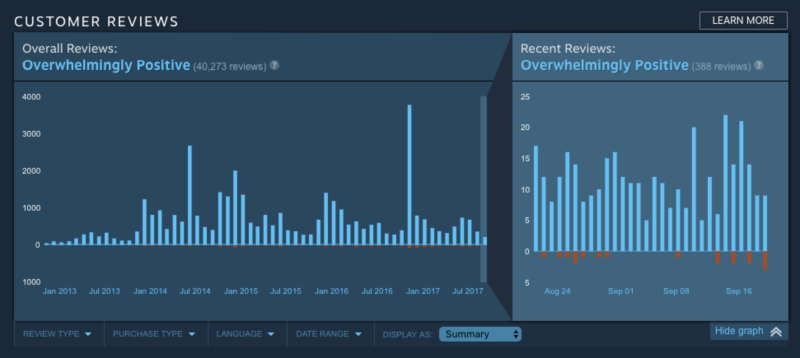Valve thinks charts will negate Steam review bombing
The new format is designed to paint a more accurate picture of a game.
Review bombing in the gaming community is a woefully old concept, but after it took the spotlight again this month, following yet another racist outburst from YouTuber PewDiePie, Valve is taking action to mitigate the damaging effects it can have on game developers. Instead of single review scores, game pages will now be accompanied by a histogram displaying a visual history of user reviews.
In a lengthy blog post on Steam's community page, UI designer Alden Kroll says changes to user reviews had been in the works for a while. He then lays out the options that Steam has toyed with, ranging from changing the way a score is calculated to simply removing scores altogether. In the event, he says, "we decided not to change the ways that players can review games, and instead focused on how potential purchasers can explore the review data."
Each game page now features a histogram of both the positive and negative reviews submitted over the lifetime of the game. Click on any part of the histogram and you'll be able to read a sample of reviews from that period. The thinking is, as a potential purchaser, you'll be able to spot temporary distortions and then investigate why that distortion happened. Take Firewatch, for example. Its reviews fell off a cliff after Sean Vanaman, from the game's developer Campo Santo, publicly denounced PewDiePie for his troubling comments. As Kroll says, you can then "decide for yourself whether it's something you care about".
The new system also has the benefit of allowing players to see how a game's reviews have evolved over time, which is particularly useful for games that operate as services. As Kroll explains, "Earlier purchasers of a game are more likely to enjoy it than later purchasers. In the pool of players who are interested in a game, the ones who are more confident that they'll like the game will buy it first, so as time goes on the potential purchasers left are less and less certain that they'll like the game. So if you see a game's reviews trending up over time, it may be an even more powerful statement about the quality of work its developers are doing."


